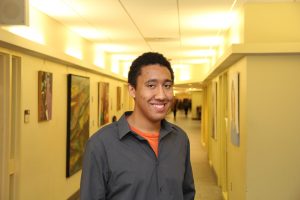HOLYOKE — Getting good grades was not the issue. For some kids, high school just doesn’t work.
“In addition to being one of the only non-white students, I was also at the top of my class, and I think a lot of people felt threatened by that,” says Noah Paradis-Burnett. “They didn’t talk to me much. They really didn’t want to have anything to do with me. I had no real support network. I just needed to find someway to get out of there.”
He found it through Gateway to College, a program for high school dropouts and those at risk for dropping out. Paradis-Burnett didn’t drop out and wouldn’t have. He was merely miserable. The Gateway program at Holyoke Community College, consistently ranked as one of the best in the United States, accepted him anyway.
At 16, he started taking college-level classes, commuting nearly two hours every day by bus from his home in Russell. “It was the best decision I’ve ever made,” he says.
A sociology class during his first semester proved to be pivotal.
“That was where I first felt I fit in with everybody else,” he recalls. “I came home that day — this is what my mom remembers — I came home with this giant smile on my face. It was like, people actually want to hang out with me and sit with me. It was such a major shock.”
He earned his high school diploma through Gateway to College then stayed on at HCC. Now 19, Paradis-Burnett will graduate Sat., May 27, with high honors, a G.P.A. of 3.95, his associate degree in mechanical engineering, and a transfer scholarship from the HCC Foundation. He will continue his engineering studies next fall at Commonwealth Honors College at the University of Massachusetts in Amherst.
Paradis-Burnett has the distinction of being in HCC’s first graduating class of National Science Foundation STEM scholarship winners. HCC’s STEM Scholars program, which started two years ago, provides up to $10,000 a year to qualified students majoring in STEM disciplines. STEM Scholars take classes together and participate in other exclusive activities and events, such as field trips and seminars.
He has been part of that program since its inception and maintained his STEM scholarship for four straight semesters.
A generally shy and reserved individual, Noah got a big boost being around so many like-minded students. “People here pull their weight,” he says. “People here are committed to their education. They’re not looking to get by. People actually want to be here, and they put in the effort so that they can be here.”
He got involved in campus life in other ways too. A black belt in tae kwon do, Paradis-Burnett joined the HCC Dance Club. “Dance is similar to martial arts, in a way,” he says. “I thought it would be fun.”
It was in academics, though, where Paradis-Burnett impressed all. He was accepted into the Phi Theta Kappa national honor society and HCC’s Green Key Honor Society. In January, he was one of only 39 undergraduate STEM students in the country selected for a prestigious winter internship sponsored by the U.S. Dept. of Energy at the famous Brookhaven National Laboratory on Long Island.
At Brookhaven, he attended research seminars, talked to scientists, and observed their work. He was particularly impressed by what he saw at the Center for Functional Nanomaterials. “They’re working on very tiny things, like the structure of surfaces,” he says.
Paradis-Burnett spent part of his last semester at HCC working on an honors project, which he presented in April at the annual Undergraduate Research Conference at UMass. For his project, “Designing User Friendly Differential Models Using MatLab,” he used a computer program called Matrix Laboratory, or MatLab, to create models to solve differential equations.
“Really, it’s just a model you can use to see how different conditions affect how systems change,” he explains. “For instance, changing the resistance in a circuit, or figuring out how big a population an environment can support or calculating economic growth.”
He will get a head start on his life at UMass this summer when he will be working for nine weeks as a paid intern in the university’s B-SMART program, which is short for Biological and Soft Matter Research Traineeship. He will be living on campus and conducting research with UMass scientists. “I’m so excited,” he says.
For now, that seems to be right where he belongs.


